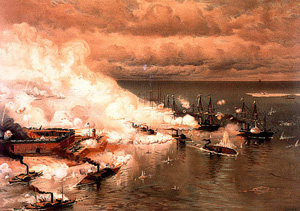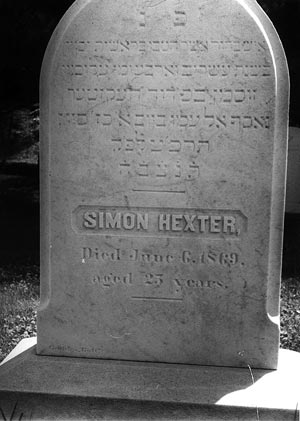The Hexter Brothers and the Civil War

Rebecca Hexter, sister of Joseph and Simon.
Joseph was older than Simon, and had been born in Treysa, Germany, in 1841, before the family moved to America. He joined the Union Navy early in the War, enlisting at Annapolis under the assumed name Joseph Dixon on July 15, 1861. He was on a number of ships, including the Allegheny, the Powhatan, the Pawnee, the Princeton, the Brooklyn and the Richmond. He was wounded in the arm while on the USS Brooklyn on April 24, 1862 during an engagement with the Confederate forces at Forts Jackson and St. Philip on the Mississippi near New Orleans. He also was involved in the capture of a Confederate ship (possibly the Tennessee) by the USS Brooklyn, for which he was ultimately able to claim (twenty years later!) the "bounty" of eighteen dollars and 31 cents, according to the naval practice of awarding prizes for such acheivements.
Joseph was on the USS Richmond at the battle of Mobile Bay, on August 5, 1864. Unfortunately, a few days after the battle, he apparently gave in to frustration and spoke disrespectfully to a superior officer when he was acting as Captain of the Afterguard. This led to his court martial by none other than the famous admiral David Farragut. He was tried and convicted, and sentenced to a year in the Parish Prison in New Orleans. A full transcription of the charges by Admiral Farragut, the court procedings, Joseph's written defense and scans of the original documents can be seen by clicking here. An interesting case heard at the same court martial concerning the loss of the USS Philippi, also brought by Admiral Farragut, is described here.
Simon was born in Baltimore in 1845. His sympathies evidently lay with the south, and so he crossed the Potomac to join the 46th Virginia Infantry (Wise's brigade) as a musician on February 5, 1862. Musicians were often a part of combat units during the Civil War - the Union outfits would sometimes have a full band (at least, early on in the war), while the poorer CSA troops might only have the odd drummer or fifer to sound the military calls such as revile or taps.
Military historical documentation of the CSA has always been much thinner than that of the Union forces. In addition to limited financial resources (compared to the north), much of the confederate records were lost as the south lay in ruins after the war, and cities such as Richmond were sacked in the aftermath of battle. However, a few letters remain to document Simon's service. He requested leave on at least two occasions, once to secure some personal property in Richmond, and once to have his instrument repaired in Savannah. Transcriptions of these letters and scans of the originals can be seen here.
The only other information that I have about Simon's service was that he was apparently captured by the Union, and spent the latter part of the war as a prisoner. A record of his parole from a prison in Richmond documents his transfer back to Baltimore on April 15, 1865. Simon died soon after the war the age of 25 on June 6, 1869. He never married and had no children. He is buried in the Washington Hebrew Cemetary in Anacostia, Washington, DC.

